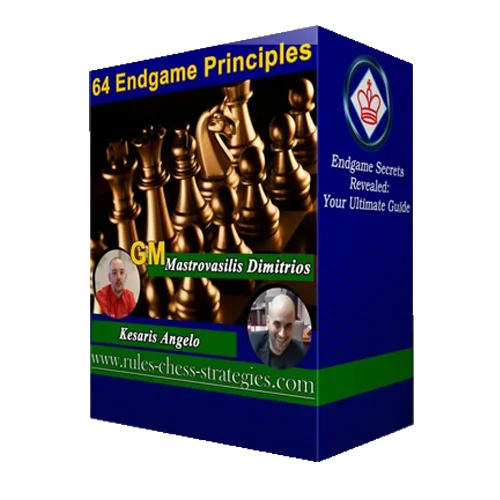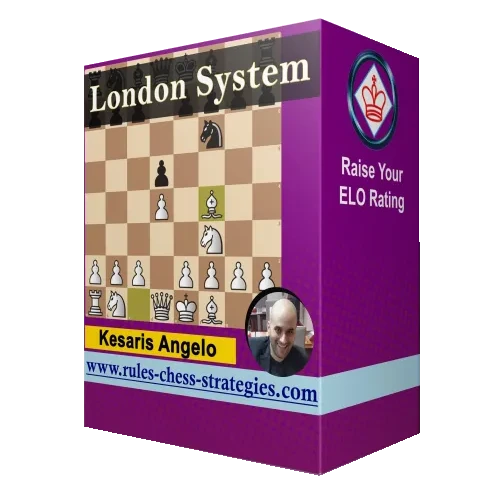After many years, Angelo Kesaris has gathered all the essential endgame principles and he and GM Dimitrios Mastrovasilis are delighted to present them to you as a single course. These principles, along with the endgame thinking system, will significantly enhance your understanding of chess.
General Information
Many chess players find the endgame to be a challenging phase of the game. Most amateur games typically conclude due to an opening trap or by checkmate in the middlegame.
In a similar vein, many individuals often urge chess trainers to instruct them in various openings and traps in the quest for swift improvements. While it’s true that learning new openings can lead to rapid progress and an increase in one’s ELO rating, it doesn’t necessarily guarantee overall improvement as a chess player.
How Can You Become a Better Chess Player?
By understanding chess and by learning the endgame. In simple words, learning the endgame is like … cheating! The endgame remains consistent, with no trendy variations like those often seen in the opening.
The Difference in Principles
The endgame principle is a fundamental aspect of chess that cannot be altered or overlooked. For instance, in the opening phase, the significance of controlling the center of the board is well-known. However, there are various opening systems, such as the Pirc or King’s Indian Defense, that deviate from this rule. Therefore, while there are certain principles to adhere to in the opening, there are exceptions to consider from time to time. This is due to the greater number of pieces on the board during this phase, leading to more complex scenarios.
Conversely, in the endgame, a key principle is to position our king at the center of the board. When only a few pieces remain on the board, the king is less susceptible to checkmate and, as a result, it should actively occupy the central squares. This principle is of utmost importance and should consistently guide our moves in the endgame.
General Understanding
Understanding the endgame and how the chess pieces collaborate can lead to improvements in both the middle game and the opening stages with minimal additional effort. For instance, if you grasp the fundamentals of endgames involving a bishop against a knight, you’ll also be better equipped to navigate similar situations in the middle game. There are noteworthy similarities between the two, allowing your knowledge of endgames to naturally enhance your performance in the middle game and opening stages.
64 Endgame Principles
After many years, I’ve gathered all the essential endgame principles and I’m delighted to present them to you as a single course. These principles, along with the endgame thinking system, will significantly enhance your understanding of chess.
You’ll become proficient in recognizing, comprehending, and making correct moves in various endgame scenarios. You’ll also acquire the knowledge of when and how to transition from the middle game to the endgame.
As a result, you’ll derive immense enjoyment from playing chess. This is because you’ll no longer need to rely on memorization. There’s no requirement to recall specific opening traps. In the endgame, you simply apply the relevant principles, and in most instances, your moves will be correct.
Why is This Course Created?
It’s a fact that chess literature focusing on the endgame is relatively limited compared to the abundance of opening courses available. Many individuals find the endgame to be a challenging and somewhat confusing aspect of chess, often not knowing where to begin their learning journey. This misunderstanding leads some to consider the endgame as dull, which is not accurate.
Lack of confidence in the endgame often drives people to push hard for a quick win through opening traps or aggressive-risky attacks in the middle game. Taking such high risks can indeed introduce a sense of randomness into the game, resulting in unpredictable outcomes.
The “64 Endgame Principles” course has been designed to address these issues and help you enhance your endgame skills. With improved confidence in the endgame, there’s no longer a need to rely on high-risk attacking strategies or piece sacrifices in the middle game. Your overall gameplay will become more balanced.
How This Course Will Help Me?
This course will contribute to your general chess improvement, enabling you to confront stronger opponents. Likewise, you’ll be better prepared to enter the endgame with a slight advantage and successfully convert it into a victory.
Here’s What You Are Going to Learn
- Understand Chess Like a Strong Player
- Develop Your Chess Thinking System
- Learn all the Endgame Principles
- How to Apply the Principles in Specific Examples
- Advanced Endgame Ideas and Motives
- Significantly Increase Your Pattern Recognition
- Develop Rock-Solid Confidence
- Unleash your potential and become the chess player you are meant to be!
Outline:
Chapter 01 – Introduction – Thinking System
1. Thinking System: Understanding the Three Game Phases
2. Demystifying the Complexity of the Endgame
3. Elevating Your Technique Through Endgame Mastery
Chapter 02 – (Power of the Pawns)
4. How to Win in Endgame: Capablanca Rule
5. Flank Pawn & Far Advanced Pawns
6. Connected Pawns
7. Passed Pawns
8. Blockade
9. Connected Passed Pawns
Chapter 03 – (Rooks)
10. Rooks Behind Passed Pawns
11. The Seventh Rank
Chapter 04 – (Bishops)
12. Bishops vs Pawns
13. Opposite Colored Bishop Endings
14. Capablanca’s Rule (Pawns to Opposite Color of the Bishop)
15. Renegade – Pawns of the Same Color as Bishop to One Flank
16. The Bishop Pair
Chapter 05 – (Knights)
17. Knight vs Pawn
18. Knight Endgames
19. Bishop vs Knight
20. The Two Bishops vs The Two Knights
Chapter 06 – (Queens)
21. Promote With Check
22. Watch Out For Perpetual Check
23. Stalemate
Chapter 07 – (Technique)
24. Pawns vs Pieces
25. Extra Pawn
26. Zugzwang
27. Two Weaknesses
Chapter 08 – (Grandmaster Understanding)
28. French Defense
29. Spanish Defense
30. Caro Kann Defense
Additional Info:
- 30 Theoretical Video Lessons
- PGN Files with games and analysis
- 50 Exercises
About the Authors:
GM Dimitrios Mastrovasilis [FIDE 2631]
is one of Greece’s top athletes, achieving the Grandmaster (GM) title in 2003. His successes began early, with five youth championships, including three consecutive titles under the age of 20, and a silver medal at the European Youth Chess Championship in 2000. In 2003, he won the 1st Mediterranean Youth Chess Championship held in Agelat, Libya, and the following year, he tied for 1st-2nd place with Kiril Georgiev in Topola, Serbia.
He has several notable achievements, including 2nd place at the Polanica Zdroj tournament in a tie with Donchenko, 3rd place in Bad Wiessee in 2021, 1st-2nd place in Bastia in 2021, 1st place in Francophonie in 2018, and 2nd place in 2019.
In 2012, he reached his peak Elo rating of 2631. In 2007, he secured 2nd place, tied with other strong players, at the Acropolis International Chess Tournament. In 2012, he won the Artemis Cup in Leros.
He has represented Greece in 11 Olympiads, 10 Pan-European Team Championships, the 1st World Team Championship in Turkey in 2010, and 2 online Olympiads. He has also represented Greece in the World Team Chess Championship and the European Team Chess Championship. In 2016, he was a member of Team Europe, which defeated Team Poland in the 8th Lublin Union Memorial. Among his greatest achievements are his participation in the World Chess Championship in 2004 and the World Chess Cup in 2017 and 2023.
Angelo Kesaris [FIDE 1928]
is a professional chess coach and FIDE National Instructor with 20 years of experience. He started teaching chess in primary schools, organizing lessons in chess clubs, private classes, and online teaching. Kesaris quickly made a name for himself by publishing practical strategies that new players can use to improve their chess.









